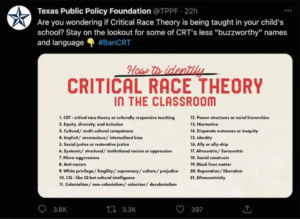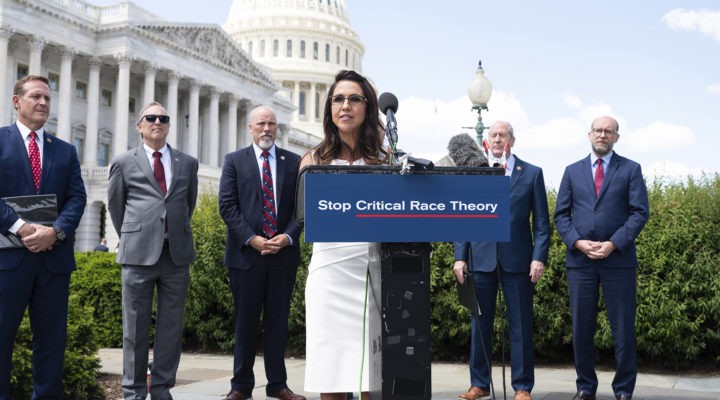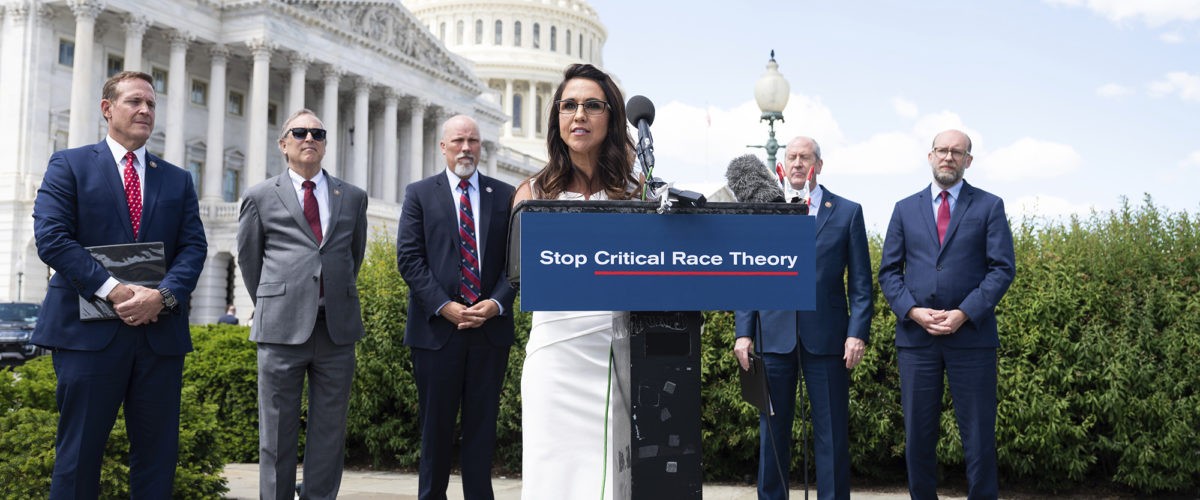In the current furor over Critical Race Theory, one set of voices most directly affected by the actual teaching of this academic theory has been missing: College students.
Axios and Generation Lab sought to correct that omission with a nationwide poll of college students conducted June 24-28. What they found is that while differences exist between students who identify as Republicans versus Democrats, college students overall are not nearly as worked up about this issue as older Americans appear to be.
Although conservative politicians, pundits, pastors and parents have been sounding dire alarms about the imminent threat of Critical Race Theory, the actual academic framework that goes by that name exists mainly in academic circles, beginning with law schools and sometimes in other academic disciplines. No evidence has been presented of Critical Race Theory being taught in elementary school, middle school or even high school.
However, conservatives alarmed about the New York Times’ 1619 Project and attempts to more accurately tell American history without omitting the stories of slavery and racism have gathered many of their complaints under the banner of opposing Critical Race Theory.
The Houston Chronicle reported June 30 that a conservative think tank in Austin, Texas, had produced social media posts warning parents that their kids might be learning Critical Race Theory in school if their teachers use words such as “colonialism,” “white supremacy” or “ally.”
 The Texas Public Policy Foundation pushed out a list of 21 buzzwords to “identify Critical Race Theory in the classroom.” That list included terms like “Black lives matter” and “equity, diversity and inclusion,” the Chronicle said.
The Texas Public Policy Foundation pushed out a list of 21 buzzwords to “identify Critical Race Theory in the classroom.” That list included terms like “Black lives matter” and “equity, diversity and inclusion,” the Chronicle said.
Meanwhile, the new poll of college students found that most of them believe their own high school history curricula was flawed in how it taught about race. Overall, 66% of respondents agreed “somewhat” or “very much so” with this assertion. And 93% said their high school history lessons were flawed specifically by not talking enough about race.
As in the rest of society, a wide gap emerged, though, between students who identify as Republicans versus Democrats. Only 23% of Republican college students thought their high school history lessons were flawed, compared to 81% of Democratic college students.
One of the key ideas of Critical Race Theory is that racism is systemic and ingrained into American culture in ways that people may not consciously understand. Nearly 70% of U.S. college students said they believe racism is mainly systemic rather than individual prejudice. However, among Republican college students, only 16% believe this — mirroring national trends among all American adults by party. Among Democratic students, 86% believe racism is systemic.
Republican college students are somewhat more likely to agree with their Democratic classmates that racism is “ingrained in law” in America. Overall, 82% of students believe this, with nearly all Democratic students (97%) agreeing and just less than half (45%) of Republican students agreeing.
Republican college students are somewhat more likely to agree with their Democratic classmates that racism is “ingrained in law” in America.
Similarly, 82% of college students said they believe high school students should be taught “that patterns of racism are ingrained in law and other institutions,” although only 42% of Republican college students agreed.
The survey results seem to indicate that few recent high school graduates have been taught about Critical Race Theory by name. Only 15% of the college students surveyed said they had heard of Critical Race Theory before entering college, but 70% said they now are aware of the term.
Awareness does not translate to understanding, however. When asked, “Do you understand what critical race theory is?” only 20% said “yes, very much so.” The largest group, at 39%, said “yes, somewhat.” The remaining 41% said either “no, not really” or “no, not at all.”
While many Republican-controlled state legislatures this year have introduced or passed bills prohibiting the teaching of Critical Race Theory or other aspects of systemic racism, these actions are not supported by most college students. Three-fourths (77%) said government should “stay out” of history curriculum, while 19% allowed that government might have some input and 4% said government should “very much” get involved in regulating history curriculum.
While many Republican-controlled state legislatures this year have introduced or passed bills prohibiting the teaching of Critical Race Theory or other aspects of systemic racism, these actions are not supported by most college students.
Other informal surveys show that public school teachers are disturbed and confused about the legislative approaches to tell them what they can and can’t teach. A June 19 report in The Hill explained: “Leaders at professional educators associations and unions say the measures have led to uneasiness among some educators about what the legislative push means for classroom discussions going forward, while others are using their collective voice to object to the bills they say are unnecessary and dangerous.”
High school social studies teacher and community organizer Larry Ferlazzo has compiled a list of resources for teachers on how to respond to criticisms that they are teaching Critical Race Theory or otherwise violating new laws passed in some states. The new legislative push is “extremely dangerous,” he warned.
Becky Pringle, president of the National Education Association, the country’s largest teachers’ union, told USA Today her organization is weighing legal action against laws restricting how racism and history are taught. “And we’ll defend any teachers brought up on charges,” she said.
A nationwide poll of all registered voters conducted in June by Politico and The Morning Consult found only 33% of respondents believe Critical Race Theory has a “negative impact on society,” while nearly half (42%) said they don’t know whether it’s negative or positive. The demographic groups most likely to see a negative impact include men, adults over the age of 65 and evangelical Christians. Adults between ages 18 and 44 are the least likely to see a negative impact.
Overall, Americans are fairly evenly divided — or confused — about whether they believe Critical Race Theory should be taught in colleges and universities. While 35% support such teaching, 34% oppose it and 31% said they don’t know.
Evangelical Christians are less confused on this question, although 30% believe it should be taught on the college level while 45% oppose it. And once again, older Republican men are the most likely to oppose such teaching at colleges.
Related articles:
White hysteria, Critical Race Theory, and eyes that dare not see | Opinion by David Gushee
What the Critical Race Theory debate has to do with Professor Harold Hill | Opinion by Mark Wingfield
Could you win a quiz show by defining ‘Critical Race Theory’? | Analysis by Mark Wingfield
Southern Baptists are still obsessed with Critical Race Theory | Analysis by Mark Wingfield


